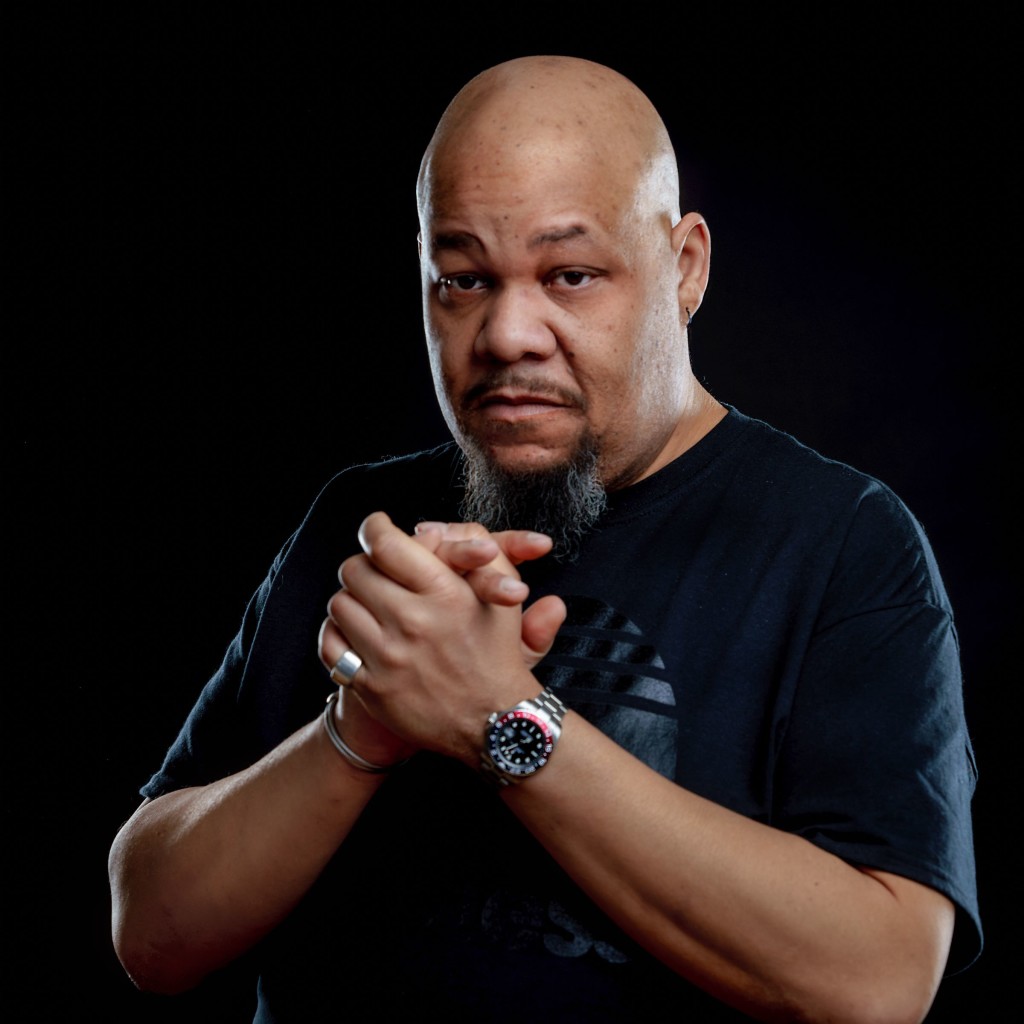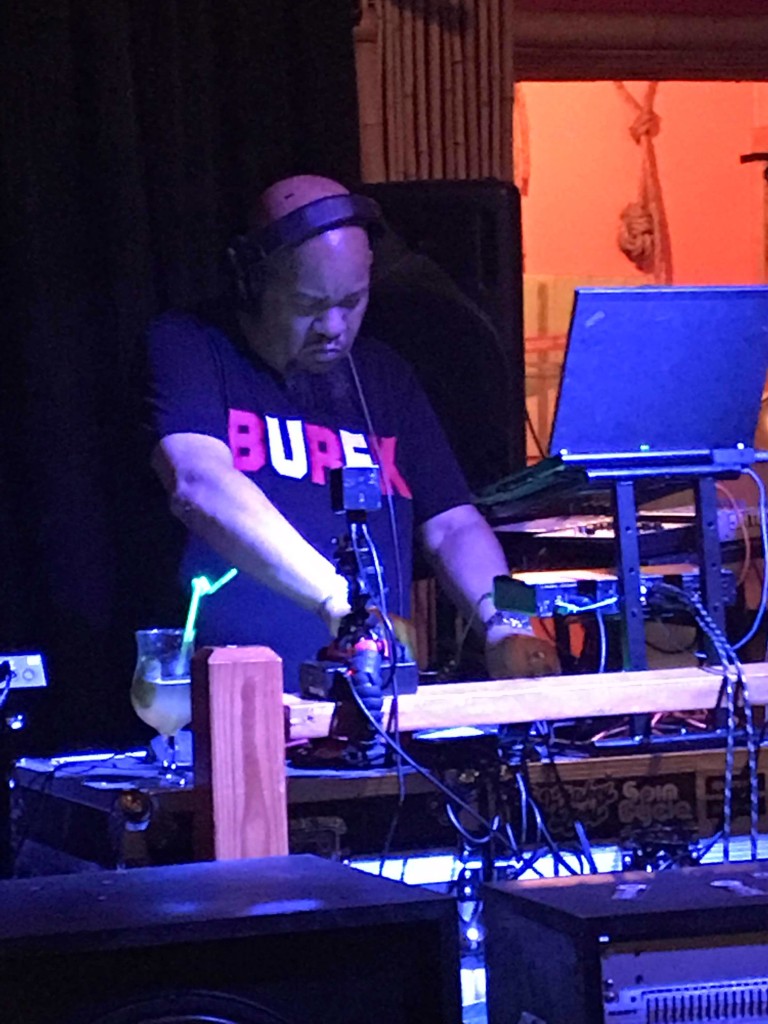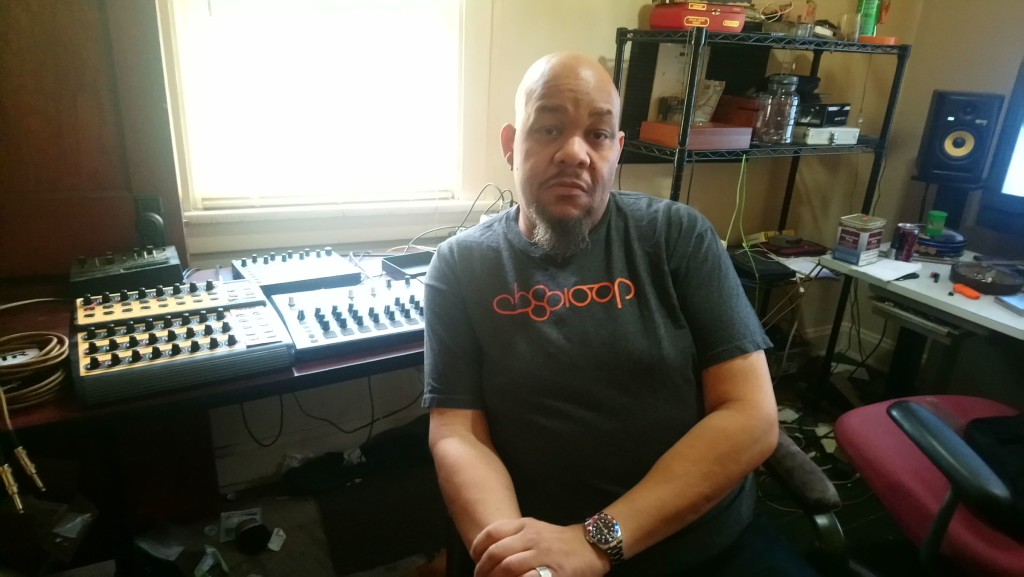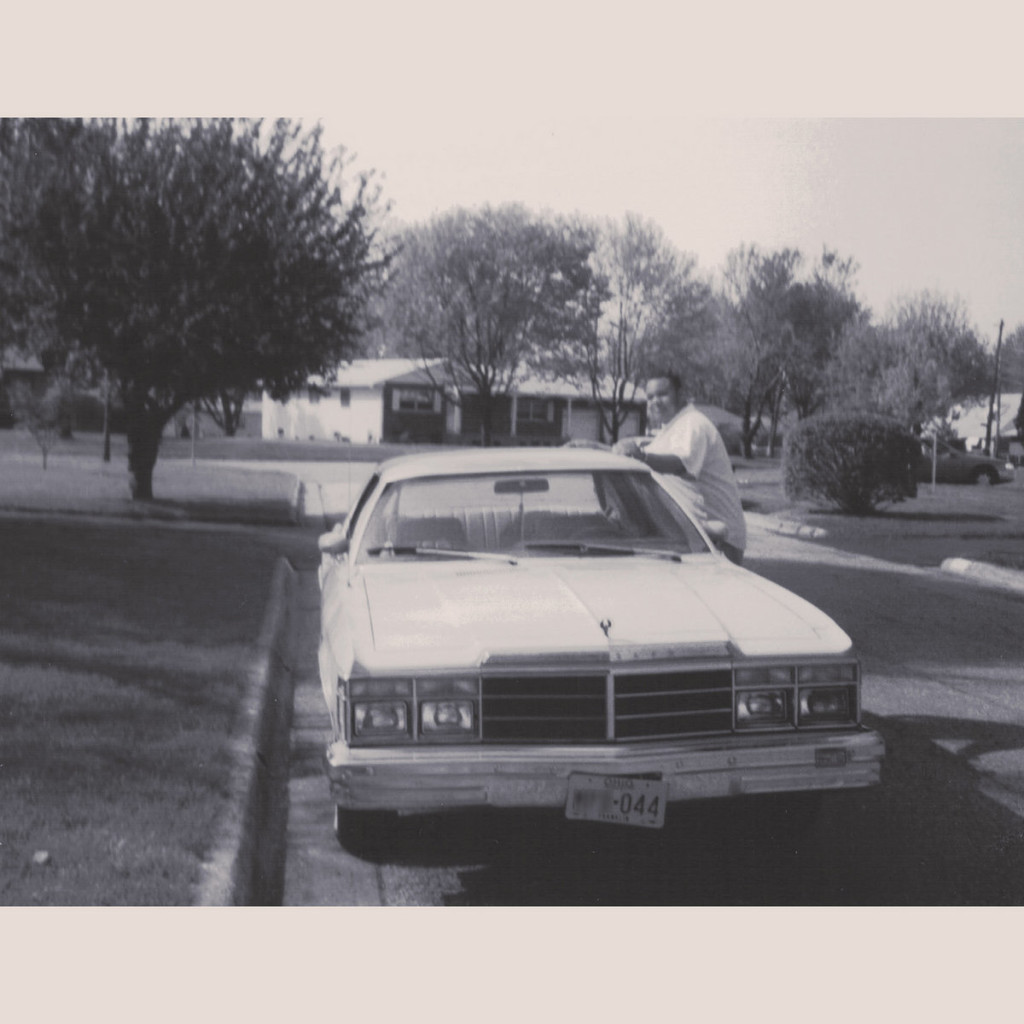This is not a museum. This is not a time to wax poetic about FBK’s stellar 25-year career. Because FBK has things to say with a steady parade of new releases, now. So if you don’t know Kevin yet – now is a great time to discover him.
Sometimes it’s people like FBK who are out of that main spotlight who might create some of what casual onlookers can miss – the connections, both on a human level and encoded in the music.

From DJ to live act to producer, the Columbus, Ohio-based artist is an underrated powerhouse. I know a lot of techno is about assembling tools, but FBK’s cuts can hit you like a great song – that feeling that you already know them. Wait, this is a classic, I remember this – but I’ve never heard it before. Take his crisp, deep release this month for France’s Knotweed Records, Throatcrush:
It feels like a suitable sequel to the dark and diverse Forced Reclusion on Ron S’s St. Louis label, Anode Records – another node in the enduring midwest techno production community.
But if you want some inspiration for techno persistence, for the craft of this music and the ability to develop its nuances over time, FBK is a humble and profound resource. I got the chance to chat with him to talk about his work.
PK: First, it strikes me you’ve been around more people and perhaps more different parts of the US techno scene over the years than … well, almost anyone. Have you picked up a lot of your technique or education in that shared time in studios? Is it also what you’re listening to as you’re out and people are playing? Given you’ve hung out with everybody from Dan Bell to Robert Hood…
FBK: I’ve enjoyed being a student of the game, probably more than I’ll ever let on. Having the ability to ‘learn at the masters’ feet’ as some may put it has been a blessing.
I’ve picked up on so much from people like Dan Bell, Anthony ‘Shake’ Shakir, and men like Jay Denham and Claude Young made a huge difference for me as a younger artist — they all told me it was imperative to find ‘me’ in my work. One of the great debts to finding my sound goes to DAC Crowell at the Aerodyne Works in Champaign, IL – I got a greater understanding and education from his vast production knowledge and his wonderful collection of rare recordings… his mentorship was priceless and without so many of these people, there’d be no me.
As far as inspiration goes, I tend to gather information all the time, and any music that gives me energy or makes me ‘feel’ tends to get reflected in my work…working with James Johnson (Plural, Kukri) as part of The Fallen changed my sound even further. I absorb my environments, and reflect these things in my own work. But I’m rather careful as to what I ingest musically. Techno is not enough for a healthy musical mind.
Actually, to that same question – has it ever been necessary to pull back from some of that, to find your own voice? I’m still very aware of your voice in your tracks.
This may be the most important thing for my own sound. As a producer and sometimes DJ, there is always a new recording from your peers, a new mix to check out, someone sending a promo to hear. You can spend hours on end listening to music in just one genre with an internet connection. If you are a producer, it’s good to know what others are doing…but advice I was given in the Hip-Hop industry years ago rings true in this music today: Even though releases can go from finished track to published in hours, that doesn’t mean you’re hearing the newest and most recent offering from an artist. They may be 2 years, 5 years ahead of what you’re hearing now.
As a producer, the question has to remain for your own work-how do YOU create the future? It’s never an easy question, but sounding like your favorite artist does you no favors. There are a thousand clones of Jeff Mills-be the best version of yourself!
How would you contrast that to, say, European kids who weren’t necessarily immersed in techno with those Detroit legends? Are you still able to hear something in their music, or is there a way to somehow connect those two experiences?
I’ve found that most of the work I enjoy the most comes from people that aren’t super connected to ‘the scene’ at large, and those who have interests in music besides simply house/techno/etc. Every genre of music has its community. While the community is seriously important, it’s also great when it becomes a ‘think tank’ of sorts rather than an echo chamber.
I think finding those who love music in general rather than those who are hoping to become famous making techno (because they can’t play guitar or sing) usually makes for better work. Making art rather than product? The speakers don’t care who you are, but the dancers care what they dance to.
What’s your current production rig looking like, in terms of instrumentation? How is that adapted to the live rig?
At this point, I’m in a pretty wonderful position…I have so many tools that I can use and many ways to work, but I still keep things as simple as I can. I have converted from Ableton Live to Bitwig Studio a few years ago (shoutout to Mea Liedl and the development team in Berlin) and I haven’t looked back. On the synth/drum machine side, I have an MPC 1000, a Novation Circuit, a Waldorf Blofeld, Arturia DrumBrute Impact and the lovely sounding Deepmind 12.
My live rig typically consists of Bitwig as the sequencer/front end, a Mutable Instruments Shruthi-1 that I built myself (and still works!), and if I leave the Shruthi at home, I have Robbie Langer’s absolutely brilliant AE Modular synth that I just cannot get enough of! Flexibility is key in the studio for me, portability and maximum effect is key for my live setup.

What’s your compositional approach? Is it really about capturing live jams, or sort of machine improvisation, or is there a longer process of assembling your tracks?
Usually, I enjoy capturing the ‘live’ feeling of an idea-I’m of the old jazz mindset that if I can’t get it right in 3 takes, I move on to something else. Most of my work is done in one take, save for maybe some of the edits I’ve done of things (I did an edit of ‘Shock the Monkey’ by Peter Gabriel that took two days). I’m not a stickler for precision – I love the feeling that a human is behind the controls, and I love the challenge of making a track that is mixed down properly and recorded well in a short amount of time.
“Against the clock” is a lifestyle for me, haha. There was a time where I had little time to work using my studio speakers, so I learned to become efficient. I rarely censor myself, I don’t ask questions like ‘is this the right hi-hat sound?’ but I tend to go on feeling. One of my most recent works, “Throatcrush,” was done with a Zaquencer [customer firmware for BCR2000] and my Circuit in about 30 minutes onto a DAT machine in my living room. Each track I do is done start to finish typically-from conception to mastering before I go on to the next one.

And your voice is literally in some of your tracks – what’s the significance of doing that for you?
I started my professional music journey singing and rapping as part of a group called “Poets of Heresy,’ so I’ve always used my voice in music…no matter how much I detest the sound of my own voice. One tune of mine, “Past Ownership’ uses my voice humming to create the bassline for that tune. Mostly, there’s usually something I want to convey that is more important than the music can say on its own.
I’m inspired by people like Jay Denham, SRVD and Radioslave to use my voice more, because in a DJ set full of instrumentals, a good vocal stands out and sticks in your head. I love repeating phrases that can’t easily be understood too, and many of my tracks come from longer sentences being chopped into smaller sections. My live work features a few speeches that I’m able to mangle into unintelligible noise to keep the audience’s interest in the main groove being set forth. The human voice in electronic music can be hypnotizing, alarming, a call to action, or all three at once…we all have one.
You talked about it a little when it was released, but I’m really enjoying the through-narrative on More Stories From The Future [2019 LP for Rekids], musically speaking. Now that you have some distance from it – assuming you’ve listened back on it – what’s your take now on how it’s assembled, and what it has to say?
It’s one of the things that I’ve done in my career that was a milestone for myself, and I’m very happy at how it came about. The first draft of the record was going to be a more ‘conceptual’ record…I filled it with interludes, ambient/experimental sounds interspersed with a couple of dance tracks.
Matt Edwards gave me the idea and push to make it a more ‘dance-oriented’ release, so I dug into works of mine that got great reception on the dancefloor when I or my friends would play them out. Some of the tracks had been through what I can best describe as an ‘aging process,’ meaning that the recording was done a few years prior and saved for ‘just the right label/person.’ A track like “Modular Life” which opens the album was originally recorded in 2015 with a plan to release it myself on vinyl. The tune that took the absolute longest to make was “The Boxing Lesson,” which came about from James Johnson showing me how he uses Native Instruments’ Maschine…and from a recurring dream I had of playing drums inside of an empty warehouse. I spent about 5 hours on that piece of music, and I’m so happy with the way it turned out.
The biggest surprise for me was when Len Faki did remixes of three of the tunes unprompted. I am still in shock…I never know who’s listening-and I’m so thankful that so many have!
There are many stories and lessons I’ve learned that culminated in that release, and the picture chosen for the album cover (taken by my lovely mother) is a photo of me when I purchased my first car. The car started the journey to buying the gear that got me to where I am now. The album is an honoring of my past, with a nod to remind me that I have so much more to accomplish.

Then we’ve got these really powerful Knotweed and Anode outings. There is this really beautiful, dark A-side on the Knotweed release. “Thoatcrush” might be jack-ier than people expect from the title. “Parse Error” is just brutal. Your release for Ron has so much detail to it… “Beaten to Submission” is so sophisticated, rhythmically, to me – “Blinking Lights” feels like it came through a wormhole, a classic we should already have known. And then a great vibe on the B-sides there, too, some really warm-sounding productions. Can you talk about how these productions fit into your larger work?
Those two releases are both special for different reasons. My release on Anode came about after playing for Ron in St. Louis. The tracks I chose were from a period where I was working on music feverishly (I tend to record as much as possible). “Beaten to Submission” was an experiment with a breakbeat that I created with my collection of drum sounds…IIRC the hi-hats are from a CR-78.
In the song “Blinking Lights,” I was inspired by a show played by Shawn Rudiman and Claude Young in Pittsburgh (who had an impromptu live jam for an hour with a wall of flashing LED lights behind them). I always believed in that tune and was going for something ‘classic’ that represented something of an ode to that night, and an ode to honesty in music, which is one of the things I love about Ron’s work.
I’m so excited about my Knotweed record right now! I picked a few of my favorite tunes that never saw release and some things that I recorded and never saw the light of day. the A-side, “Repressed Blood” came from a repeating sound on my iPad after I’d stopped playback on something else I was working on, that sound is not necessarily ‘quantized’ as it was sampled, looped and made into the tune. There’s a short clip of Dr. Norman Vincent Peale as the vocal sample in it. “Parse Error was recorded on a Roland VS-880 that I owned for a short time and features the Shruthi at her nastiest. My work catalog is filled with my want-to-use different production techniques and challenging myself to not sound exactly the same as yesterday.
There are some suggestive titles in these releases, too. I wondered if you wanted to talk about the messages behind those at all, or what sorts of things you do channel into your music.
Many of the titles are autobiographical in nature…my wife has been the inspiration for a few of my tunes, currently notable is ‘074’ which comes from her playing a game of BINGO on her iPad in my studio. Some of the others, like ‘Forced Reclusion’ came from the feeling of being trapped in my studio and not getting to perform as much as I’d like, along with the feeling that at times I’ve been held back while others have received more..little did I know that 2020 would force all of us into reclusion. There are times when the idea for the track comes from the title itself, and many other instances where it’s come from something that has happened in my day or while working. I’ve always loved the use of language to convey emotion, and knowing that words and phrases can have an effect on those who read and interpret them. To me, the English Language is one of the greatest weapons in my possession. In my own work, I use it to confront inequality, pose questions, entice listeners to think, and convey emotion to what some feel is music devoid of emotional content. My public work is deeply personal, and only some stories are appropriate.
I know you were really on what I think is a well-earned, insanely overdue upswing in terms of getting some attention and international bookings – and then we all got grounded. If we could make that heard, what sort of desire would you have about things proceed after this – for you, or even for the scene around you, for that matter?
What I would absolutely love to see happen is for the trash in our scene to take itself out, which seems to be happening. This music has no place for those who are mainly profiteers and hate-mongers. The techno scene deserves unity and a freedom from derision — respect for artists large and small, women, people of color, LGBTQ+. Any who enter this scene should know its roots are varied, twisted and deep.
I’m very happy that I’ve gotten the opportunity to be a participant in dance music, and hopefully, the world will allow me to grow my place in this music even more.
I have more stories to convey and I want to do it face to face with those who have supported me. That said, everyone wash your hands and be safe-we will get through this! When we do, I hope the line-ups begin to reflect the grand spectrum of what techno has to offer. The differences between us make for better music.

I know these things come in waves – and we have had waves like this before. But is there a sense that in the midst of the Black Lives Matter activism, there is finally more visibility (and visibility for a new generation of fans) for black artists? Are there any signs that someone is integrating activism into their larger music work, or is it too soon to tell? (I definitely don’t have those answers myself, but I wondered if you had a take.)
My wife and I have both been involved in activism and the anti-racism movement for most of our lives, and I’m proud that a new generation has taken up the mantle to affect change in this country. I support BLM and those who are taking up the fight that has been going on for what seems like forever.
That said, and this will be controversial for some- all music with a drum IS inspired by Black music and people of color. The drum is central to everything and is the heartbeat of nearly every popular musical genre. There are few genres of music that haven’t been touched, inspired, or changed by people of color, and to me, that deserves visibility. The hope has always been that through great works, the best rise to the top.
I’m happy that groups like SRVD have produced songs like ‘Black on Black’ and so many others are bringing this to the forefront now. However, techno, especially Detroit Techno has always been a protest against oppression, brutality and mistreatment at the hands of police and others. I think it’s too soon to tell, but when we get to the ‘new normal,’ hopefully we will see more diversity and equity shine through. We all need each other to be allied, and be stronger than the forces that try to separate us.
At least we’re seeing some Bandcamp sales on the uptick… I’ll be plugging your releases again.
Speaking of Bandcamp releases and activism-I have a track on this compilation which features a host of great artists, both white and POC – United for Equity in dance music. The proceeds from the release will be split between the Bail Project and Black Lives Matter.
I’m very proud to be part of this release. My tune “Take The Hearth” is specifically in reference to confronting the underlying issues that continue to stoke the fires of inequity and racism in the US. The hearth used to be considered the centerpoint of old homes. We must extinguish the fire of hate in order to control what happens from here…and though that may seem violent, no tended fire will extinguish itself.
Meanwhile, can you tell us a little bit about what you’re up to now and where your focus will be next? I know that also involves juggling an ‘essential worker’ job that can be demanding. Do you find some space to get away from that?
Currently, I’m still working on a follow-up album to “more stories…” which hasn’t yet been given a release date. I’m always working on music, remixes for others and mastering for digital labels like Northern Parallels. As an ‘essential worker,’ I’ve seen little downtime, so I have joked that everyone else has had time to ‘catch up,’ but food, clothing, and shelter are necessary items – so I work.
My focus recently has been finding new directions for FBK to grow, and re-establishing my old moniker of The Sleep Engineer, who may see a release in late 2020 or early 2021. Music has always been my escape from everything, and my studio is the one room in the house that I spend the most time in. There’s also a 5-string bass that I need to play around here…
Anything else you’re listening to now? Not so much mixing things into DJ sets, but are you still listening to releases?
Oddly enough, I rarely listen to techno when I’m home or at work. Recently, I’ve been listening to music by bands like Cardiacs, Cold Showers, Freddie Gibbs and Madlib, Tearful Moon, Techniques Berlin, Xeno and Oaklander, Martial Canterel, and Author & Punisher.
But, Shawn Rudiman’s newest album “Conduit” has been in heavy rotation, along with the latest offerings from Xiorro, Alan Oldham, and Kukri. Radioslave’s ‘Radio Silence’ album is brilliant. I’m always listening to something when I can’t be in my studio working…and I’m hearing some great releases coming out from people like Henry Novelo and an upcoming release from Myles Serge’ Clark just to name a few people. The world is full of sound, and far too interesting to listen to only one style of music.
Thanks for giving us plenty to fill our ears with, from yourself and others, and ideas to reflect, as well.